- Home
- Harry Harrison
Return to Eden Page 9
Return to Eden Read online
Page 9
Ambalasei straightened up and walked the length of the dock, then back. The evening breeze was cooler and it would soon be time to sleep. She turned to Enge and held up her clasped thumbs to indicate that an important question was held between them.
“All of this pleases me, as you correctly said. Though I will be pleased even more when I see the system in operation. But has Ugunenapsa in her wisdom revealed to you the answer to the other vital question that I asked you?”
It was Enge’s turn to sign a worried negative. “If she only could. The pleasure I have gained in the salvation of the city is lost in the reality that I see no salvation for the Daughters of Life. We will remain here, studying Ugunenapsa’s wisdom, and grow old in our studies.”
“Grow old and die and that will be the end of everything.”
“Everything,” Enge echoed in tones and overtones dark as death itself. She shook herself as though a cold wind had brushed her, held out her hands and willed them to turn from the dark green of grief to a roseate color of hope. “Yet I will not stop searching for an answer to this. One must exist. It is my own inferior inability to recognize it that is the problem. You do think that there is an answer, don’t you, great Ambalasei?”
Ambalasei did not speak. That was kindest. She turned away and directed her attention to the water and sky. But the failing light made her think of death.
Death was something that Vaintè never considered. Nor life either. She just existed. Catching fish when she grew hungry, drinking at the spring when thirsty. It was a mindless and empty existence which suited her now. Occasionally when she did think of the things that had happened she grew restless and uncomfortable and clashed her teeth together in the grip of strong emotions. She did not like that.
It was better not to dwell on such disturbing matters, best not to think at all.
Fanasso to tundri hugalatta, ensi to tharmanni—foa er suas tharm, so et hola likiz modia.
TANU SAYING
* * *
Keep your gaze on the forest and not on the stars—or you may catch sight of your own tharm up there.
EIGHT
Kerrick called a halt when the heat under the trees became oppressive.
“It is too early to stop,” Harl said, making no attempt to conceal his disagreement with the decision. This was his sixteenth summer and he was more of a hunter now, less of a boy.
“For you, perhaps. But the rest of us will stay here during the heat of the day, go on when it is cooler. If the strong hunter does not wish to rest he can scout the track ahead. Perhaps his spear can find fresh meat.”
Harl happily dropped the poles of his travois and stretched his tired back. As he seized up his spear again Kerrick stopped him.
“Take the death-stick as well.”
“It is not good for hunting.”
“It is good for killing murgu. Take it.”
Harl loped off silently down the trail and Kerrick turned to Armun who was seated, wearily, with her back to a tree.
“I should have stopped earlier,” he said.
“No, this is good. Unless I walk I will not get my strength back.” Darras, who had been carrying the baby, passed her down to her mother. Armun wore only a loose skin around her waist because of the heat, held the baby now to her breast. Arnwheet was not pleased by all this domesticity and lack of attention and he pulled at Kerrick’s arm.
“I want to go hunt with Harl. My spear thirsts to drink an animal’s blood.”
Kerrick smiled. “Big talk for small boy. You have been hearing too many of Ortnar’s hunting stories.” He glanced up as he said this, looked back under the trees and along the trail they had taken. It was empty. The lame hunter would be some time catching up with them for he moved very slowly. This march was going to be a long one. Kerrick took the smoked meat that Darras handed him, sat down beside her and began to eat. Arnwheet, hunting forgotten at the sight of food, sat next to him as well. They had almost finished when there was movement under the trees. Kerrick reached for his hèsotsan and Arnwheet laughed.
“It is only Ortnar. Do not shoot him.”
“I won’t. But my eyesight is not as keen as that of the mighty small hunter.”
Ortnar limped up slowly, dragging his dead leg, streaming with perspiration. Darras hurried to him with the water gourd and he drained it, then let himself slide down the bole of a tree until he sat on the ground. “You stop too early,” he said.
“Armun tires quickly. We will go on when it is cooler.”
“Keep your death-stick pointed towards me,” he said quietly. “There is something out there, it has been stalking me for some time now.”
“Come to me, Arnwheet,” Armun said quietly. “You too, Darras. Leave those things, move slowly.”
The girl trembled but did as she was told. Kerrick stepped to one side so he could see the forest wall without Ortnar being in the way.
There was a sudden crashing and the large dappled, green and white form hurtled through the undergrowth towards him.
When he raised his weapon the beast screamed fiercely through widespread jaws. Kerrick squeezed the hèsotsan but the marag did not stop. Squeezed again as it loomed over him, stepped back as it fell heavily, almost at his feet.
There was a quick movement in the air and Arnwheet’s little spear thudded into the carcass.
“Well done, great hunter,” Ortnar said, an unaccustomed smile on his lips. “You have killed it.”
Arnwheet came forward, more than a little afraid of the large creature, then bent and pulled his spear free. “What is it?”
“A marag.” Ortnar spat on the corpse. “See the teeth, a meat eater.”
“Then we will eat it, instead of it eating us!”
“They are no good, the flesh is poison.”
“Then I will cut off its tail.”
Ortnar smiled. “The tail alone is bigger than you. But take one of the claws from the hind foot. You can hang it around your neck next to your knife for all to see.”
“Will there be more of them?” Armun asked, taking up the baby and moving along the trail away from the corpse. It stank.
“I don’t think so,” Ortnar said. “This kind, I’ve seen them before, they hunt alone. Its smell will keep any other murgu away.”
“Myself as well,” Kerrick said, going to join Armun and the others. Ortnar stayed where he was, spear ready, to watch over the boy. Harl returned soon after that and admired the kill.
“There is no game. I think this marag has frightened off everything else in the forest. We are not far from a large trail. There are the marks of travois poles on it.”
“New marks?” Armun asked, hopefully.
“Very old, grown over. Hard to see.” He took his flint knife and went to help the blood-splattered boy cut off the claw.
It was not a long trek, but they moved even more slowly now. Ortnar protested but Kerrick insisted that Harl stay with him, armed with a hèsotsan. Kerrick would go ahead with the others and guard them against the deadly creatures of the forest.
They were eight nights more on this trail, the main one leading north that the sammads had used, before Harl came running up from behind them, calling out.
“What is wrong?” Kerrick said, raising his weapon.
“Nothing. But Ortnar says that you have passed the track we must take. Not far back.”
Ortnar was leaning on his spear when they came up. He pointed with satisfaction to a broken branch that was almost completely concealed by the undergrowth. “I marked it, when I was here last. This is the way.”
Ortnar went first and they were forced to go as slowly as he. But it was not far, along a ridge and across a shallow stream. From the top of the next ridge they could see the shore of the ocean. The waveless shore of a slow-moving river, tall reeds and birds, and across the narrow stretch of water the bulk of an island.
“Beyond the island there is an inlet, much wider than this river, before you reach the small islands along the coast,” Ortnar sai
d.
“Then we will make our camp on this side of the island, among the trees over there, where we cannot be seen from the sea. We must get wood for a raft. If we do that now we can cross before dark.”
“I like it better than Round Lake,” Armun said. “I think we will be safe here. Far away from murgu. Of all kinds.”
Kerrick ignored what she said, knowing perfectly well who she was talking about. But she was right, she would be happier here away from the Yilanè males. But would he? Already he missed the richness of their talk, the subtle references and gestures, implications of a kind he could not express in Marbak. They were a part of his sammad and he was the lesser for their absence.
“Is the hunting good here?” Arnwheet asked.
“Very good,” Ortnar said. “Now help Harl gather the wood for the raft.”
It had been a hot and dry summer. Because of this the great river was very low. The water meadows, flooded during the winter and spring, now stretched verdantly along the river’s edge and were carpeted with lush green grass. The deer moved through it, thigh deep, grazing. When the sammads had arrived and reached the edge of the bluff above the meadows there had been only happiness at this sight.
They had spread out and made camp in the cool shadows under the trees. After dark, after they had all eaten, the sammadars drifted up one by one to sit by Herilak’s fire. He was no longer their war leader for they were no longer at war. But it was a natural thing to do as long as the sammads marched together.
“The mastodons grow lean,” Har-Havola said. “We could stop in this place, the grazing is good. That is what I am going to do.”
“It is not the mastodons I care for—it is the hunting,” Herilak called out and there were many shouts of agreement. “And I am tired of killing murgu. Some of them are good for eating, but nothing tastes like deer. You saw the fields below. We need skins too—most of you look like Sasku with woven charadis tied about you instead of warm furs.”
“Fur is too hot in the summer,” said Kellimans, humorless and unimaginative as always.
“Of course,” Herilak said. “But the hunting is good here, winter will come, it might be that we will hunt north in the cold. Many things can happen. I am stopping here with my sammad to hunt. Then we will go on.”
There were shouts of agreement, not a dissenting voice. The women who were listening agreed as well. Here they could find familiar things to eat that they had almost forgotten about, roots and berries, mushrooms, tubers in the ground if you knew which were the right plants to dig up. There were already young girls who had never done this: they must learn. A stop here would be a very good thing.
Merrith wanted to stay here just as much as the others. But she found one who was unhappy.
“You have been beaten, that is why you cry,” she said to the girl. “No hunter should do that to you. Take a piece of wood and hit him back. If he is stronger than you are, then you hit him when he is asleep.”
“No, it is nothing like that,” Malagen said, the tears glistening in her dark eyes. Like all Sasku she was far thinner and shorter than the Tanu, her olive skin and black eyes a contrast to their blond hair and pale skin. “Newasfar to me is good, that is why I come with him along. I am foolish to act like this.”
“Nothing foolish. You miss your friends, your sammad, even the way we speak is different.”
“I learn.”
“You do. Me, I never learned a word of your Sasku.”
“It is called Sesek, what we speak. And what you say is not true. I have heard you say tagaso, that is Sesek.”
“That is because I like to eat it, easy to remember.”
“I have some of it dried that I can cook for you.”
“Save it. You will want it for yourself. And tomorrow we will have many new things for you to try. We will take the berries and make ekkotaz. You are going to like that.”
The Sasku girl was small, no bigger than her children were when they were little. Merrith wanted to reach out and touch her hair. But that was not right, not with a grown woman. The girl was better now. Merrith walked on along the fires, just wanting to be alone. Or maybe she did not want to be alone and that was the trouble. Her daughters grown, gone. Soled dead in the murgu city. Melde now with her hunter, with sammad Sorli. No one knew where they were for they had gone north when the others had fled to the west. Perhaps she was still alive somewhere. But Merrith’s own hunter, Ulfadan, wasn’t. She knew that the Tanu do not mourn the dead, knew that every hunter found his rightful place when his tharm was there in the stars. She looked up at the star-filled sky, then back at the fires and sighed. Better a hunter alive than a tharm in the sky. She was a strong woman. But she was also alone.
“Don’t walk too far from the fires,” a voice called out. “There are murgu out there.”
She squinted in the firelight to see who the guard was. “Ilgeth, I have killed more murgu than you have ever seen. Just keep your death-stick pointed out there and I will take care of myself.”
The sammads slept but the fires burned brightly. Guards watched the forest. Something crashed about in the darkness and there were shrill squeals of pain. It was always like this. Without the death-sticks they could not stay this far to the south. Only the tiny but deadly darts could kill the large murgu that hunted here.
The noises of death in the forest woke Herilak who had only been lightly asleep. He looked up at the starlit sky through the open tent flap. Something buzzed in his ear and he slapped the flying insect. The hunting would be good tomorrow. But he did not want to stay here too long. Kerrick was out there somewhere and he was going to find him. That meant searching carefully along the track as he went, to see if other tracks went off of it. There should be other sammads out here, perhaps Kerrick was with one of them. As soon as they had hunted and the mastodons had eaten their fill they must go on.
A bright line of fire struck across the sky, then died away. A new tharm perhaps. Not Kerrick’s, he hoped that it was not Kerrick’s.
Enge hantèhei, atè embokèka iirubushei kaksheisè, hèawahei; hèvai’ihei, kaksheintè, enpeleiuu asahen enge.
YILANÉ APOTHEGM
* * *
To leave father’s love and enter the embrace of the sea is the first pain of life—the first joy is the comrades who join you there.
NINE
Here, just beyond the breaking waves, was a very satisfying place to be. Vaintè floated with her body submerged, her head above the water. The waves rose and fell under her with an easy rolling motion, marching in from the ocean in steady rows. Lifting her, passing on, curling and crashing onto the sand in a surge of white foam. When the waves rose the highest she looked towards the shore and could see beyond the green wall of the jungle to a row of gray mountains far inland. Had she seen them before? She could not remember; it did not matter. She opened her nose flaps and blew them clear of water, inhaled again and again. The transparent membranes slid over her eyes as she slipped under the water, dived deep.
Deeper and deeper until the water darkened and the surface was a distant glitter high above her. She was a strong swimmer now, almost a part of the underwater world. The seaweed beds were just below her, bowing and swaying in the undercurrents from the shore. Small fish sheltered here, darting for safety as she moved towards them. They were not worth pursuing. Ahead she saw something better, a large school of flat, multicolored fish moving like an underwater rainbow. Vaintè rolled over and kicked in their direction, arms extended, her tail and legs moving together to drive her forward.
Dark forms arrowed down before her, she twisted aside; she was not the only one to see the fish. More than once she had been pursued by large predators and had to escape by swimming ashore. Were these the same? No, they were smaller and more numerous and somehow familiar. For too long now she had existed in a timeless state, seeing but not thinking, making no effort to rationally analyze what was before her eyes, so that at first she did not recognize them. Hanging motionless in the water, a thin stream o
f bubbles rising from her nostrils, she watched as they approached. Only when they were very close did she realize that she was looking at other Yilanè.
The pain in her chest and a growing darkness before her eyes forced her to realize that she had been down too long, drove her to the surface to gasp in air. The shock of seeing Yilanè in this empty place tore at the fog that had clouded her mind, idle so long. An efenburu of young in the sea, come here from some distant city, that is what they must be. But the young elininyil never ventured far from their birth beaches. And there was something else, something different. These creatures were too large, far too large to be an unemerged efenburu. They were fully grown. If so—what were they doing here?
A head surfaced nearby, then another and another. As she had seen them, so had they seen her. Unthinkingly Vaintè turned in the water, swam towards shore, away from their presence. Into the breaking surf, riding it up onto the sand, then struggling through the surge to the familiar beach beyond. When her feet left the sand and slapped through the mud she halted, looking at the trees and swamp ahead of her. What was she doing? What did she want to do? Was she fleeing from them?
Unaccustomed questions, unaccustomed thought. She felt restive, disturbed at the idea of trying to escape. She had never before retreated, had never sought to flee from difficulties. Then why was she doing it now? Although she had been standing with arms hanging limply, head lowered, when she turned about to face the ocean her head was high, her back straight. Dark figures were emerging from the surf and she walked slowly towards them and stopped at the edge of the sand.
Those closest to her halted, knee-deep in the surf, staring with expressions of doubt on their partly opened mouths. She stared back assessing them. Fully grown fargi. But they stood with a blankness of movement that communicated very little.

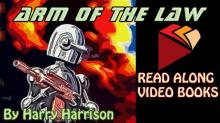 Arm of the Law
Arm of the Law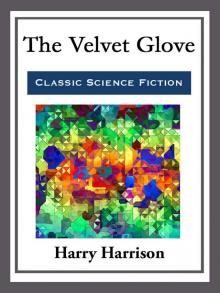 The Velvet Glove
The Velvet Glove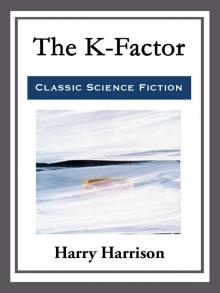 The K-Factor
The K-Factor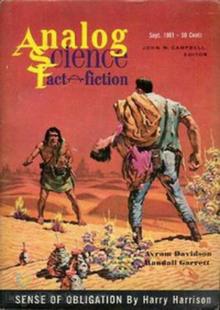 Sense of Obligation
Sense of Obligation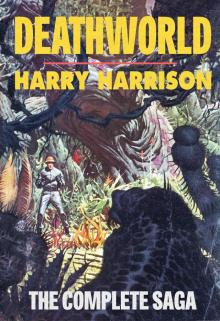 Deathworld: The Complete Saga
Deathworld: The Complete Saga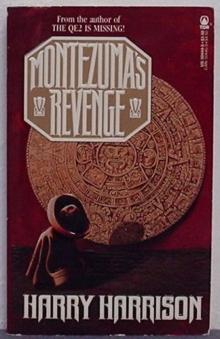 Montezuma's Revenge
Montezuma's Revenge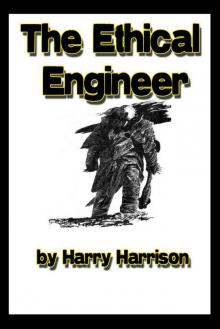 The Ethical Engineer
The Ethical Engineer The Stainless Steel Rat Returns
The Stainless Steel Rat Returns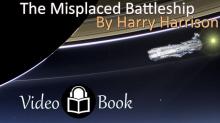 The Misplaced Battleship
The Misplaced Battleship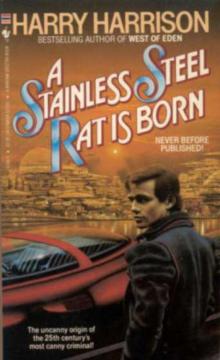 The Stainless Steel Rat is Born
The Stainless Steel Rat is Born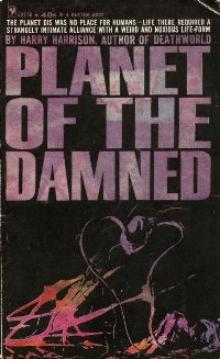 Planet of the Damned bb-1
Planet of the Damned bb-1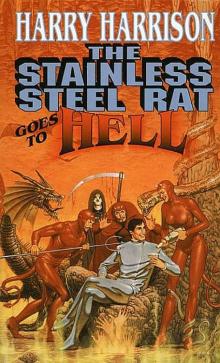 The Stainless Steel Rat Goes to Hell ssr-10
The Stainless Steel Rat Goes to Hell ssr-10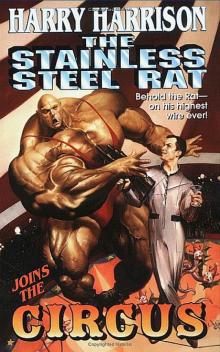 The Stainless Steel Rat Joins the Circus ssr-11
The Stainless Steel Rat Joins the Circus ssr-11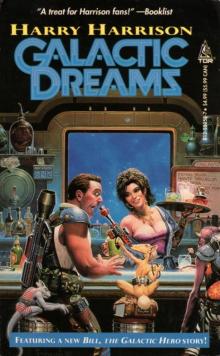 Galactic Dreams
Galactic Dreams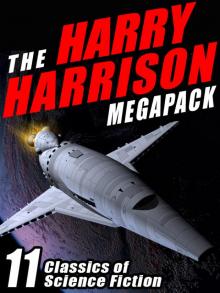 The Harry Harrison Megapack
The Harry Harrison Megapack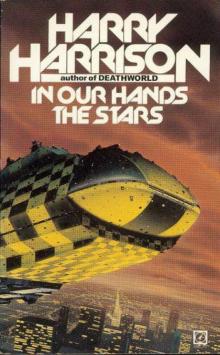 In Our Hands the Stars
In Our Hands the Stars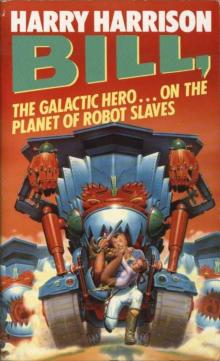 On the Planet of Robot Slaves
On the Planet of Robot Slaves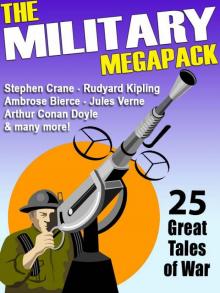 The Military Megapack
The Military Megapack Make Room! Make Room!
Make Room! Make Room!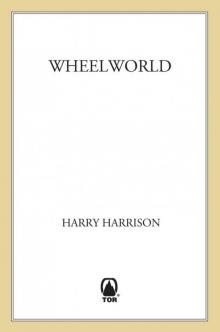 Wheelworld
Wheelworld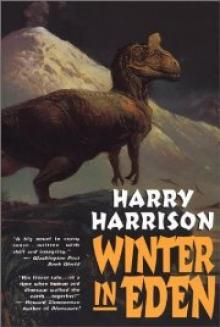 Winter in Eden e-2
Winter in Eden e-2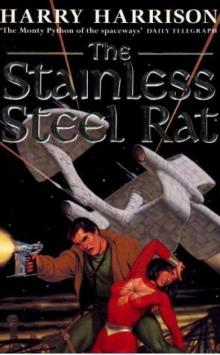 The Stainless Steel Rat
The Stainless Steel Rat The Stainless Steel Rat Goes to Hell
The Stainless Steel Rat Goes to Hell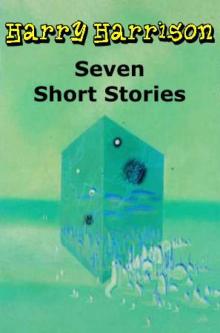 Harry Harrison Short Stoies
Harry Harrison Short Stoies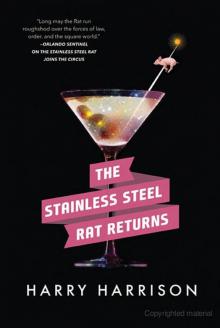 Stainless Steel Rat 11: The Stainless Steel Rat Returns
Stainless Steel Rat 11: The Stainless Steel Rat Returns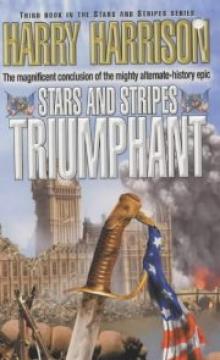 Stars and Stripes Triumphant sas-3
Stars and Stripes Triumphant sas-3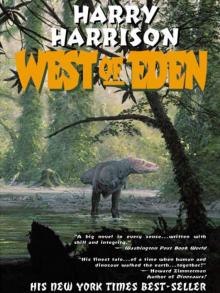 West of Eden
West of Eden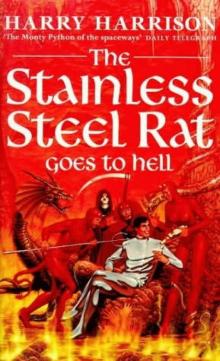 The Stainless Steel Rat Go's To Hell
The Stainless Steel Rat Go's To Hell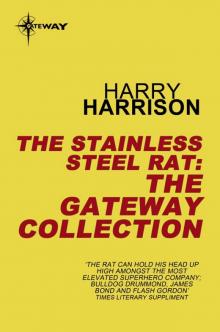 The Stainless Steel Rat eBook Collection
The Stainless Steel Rat eBook Collection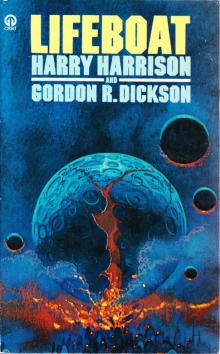 Lifeboat
Lifeboat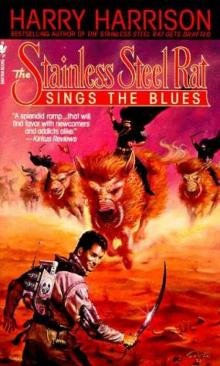 The Stainless Steel Rat Sings the Blues
The Stainless Steel Rat Sings the Blues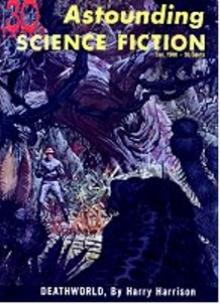 Deathworld tds-1
Deathworld tds-1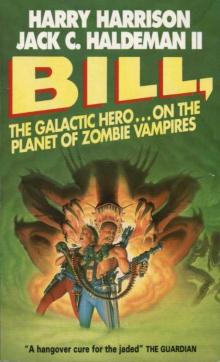 On the Planet of Zombie Vampires
On the Planet of Zombie Vampires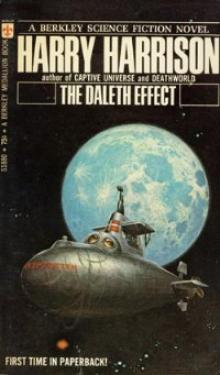 The Daleth Effect
The Daleth Effect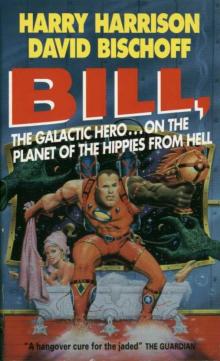 On The Planet Of The Hippies From Hell
On The Planet Of The Hippies From Hell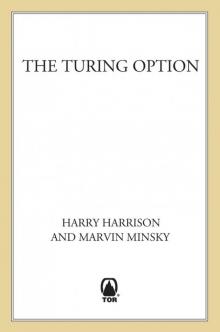 The Turing Option
The Turing Option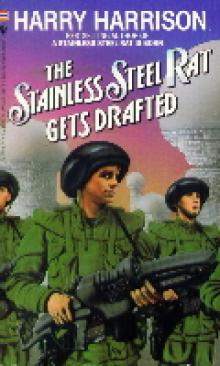 The Stainless Steel Rat Gets Drafted
The Stainless Steel Rat Gets Drafted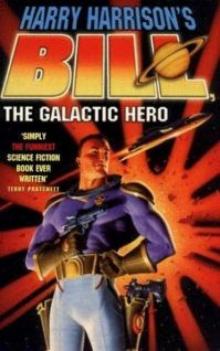 Bill, the Galactic Hero btgh-1
Bill, the Galactic Hero btgh-1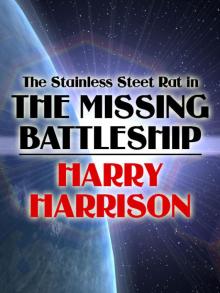 The Stainless Steel Rat in The Missing Battleship
The Stainless Steel Rat in The Missing Battleship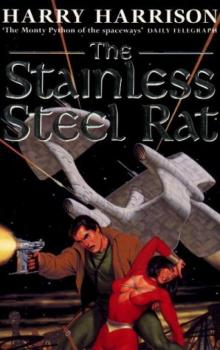 The Stainless Steel Rat ssr-1
The Stainless Steel Rat ssr-1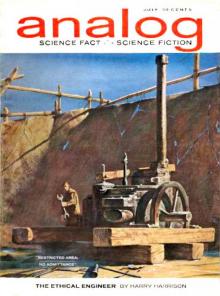 The Ethical Engineer (the deathworld series)
The Ethical Engineer (the deathworld series)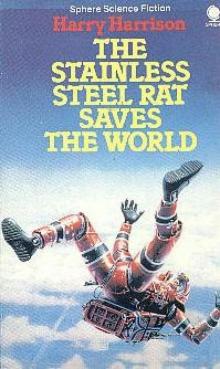 The Stainless Steel Rat Saves the World ssr-3
The Stainless Steel Rat Saves the World ssr-3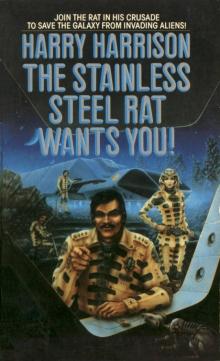 The Stainless Steel Rat Wants You
The Stainless Steel Rat Wants You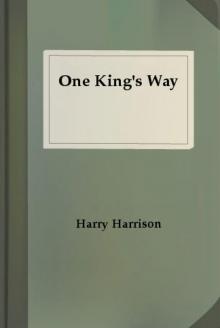 One King's Way thatc-2
One King's Way thatc-2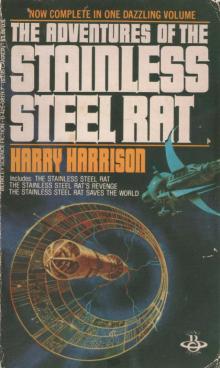 The Stainless Steel Rat Saves The World
The Stainless Steel Rat Saves The World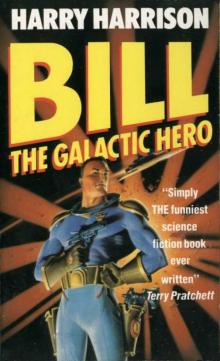 Bill, the Galactic Hero
Bill, the Galactic Hero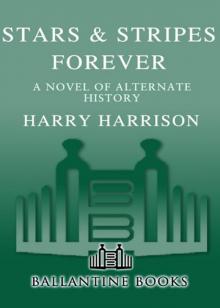 Stars & Stripes Forever
Stars & Stripes Forever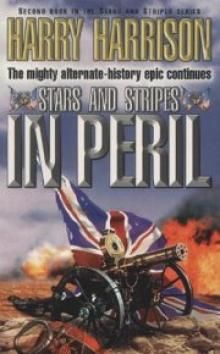 Stars and Stripes In Peril sas-2
Stars and Stripes In Peril sas-2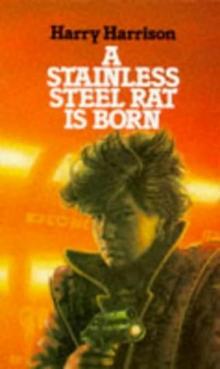 A Stainless Steel Rat Is Born ssr-6
A Stainless Steel Rat Is Born ssr-6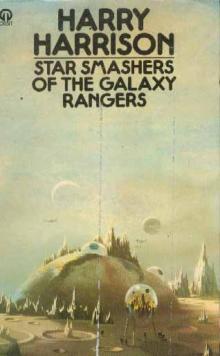 Star Smashers of the Galaxy Rangers
Star Smashers of the Galaxy Rangers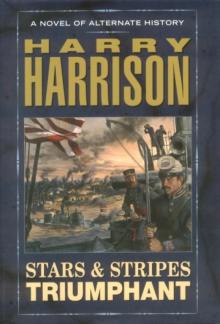 Stars & Stripes Triumphant
Stars & Stripes Triumphant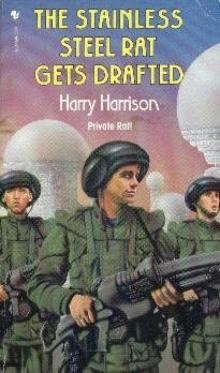 The Stainless Steel Rat Gets Drafted ssr-7
The Stainless Steel Rat Gets Drafted ssr-7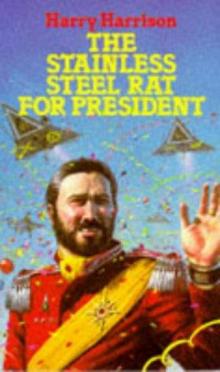 The Stainless Steel Rat for President ssr-5
The Stainless Steel Rat for President ssr-5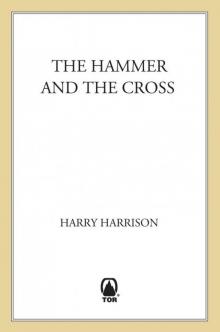 The Hammer & the Cross
The Hammer & the Cross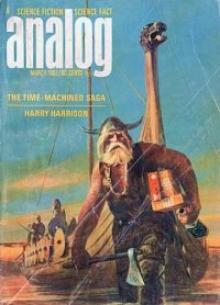 The Technicolor Time Machine
The Technicolor Time Machine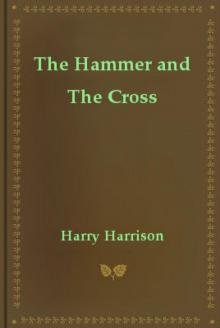 The Hammer and The Cross thatc-1
The Hammer and The Cross thatc-1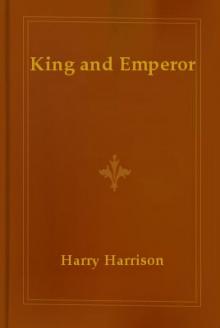 King and Emperor thatc-3
King and Emperor thatc-3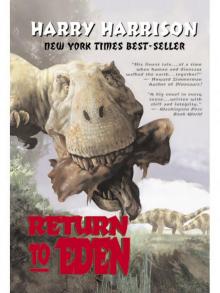 Return to Eden
Return to Eden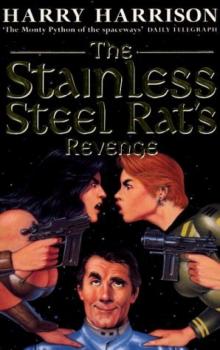 The Stainless Steel Rat’s Revenge ssr-2
The Stainless Steel Rat’s Revenge ssr-2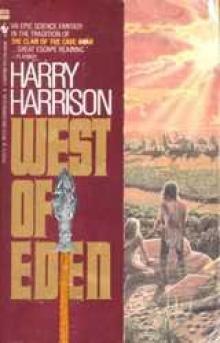 West of Eden e-1
West of Eden e-1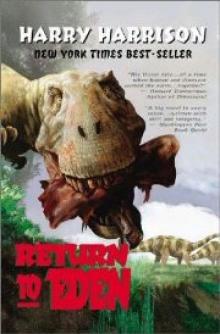 Return to Eden e-3
Return to Eden e-3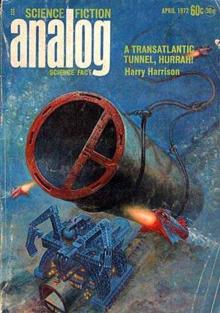 A Transatlantic Tunnel, Hurrah!
A Transatlantic Tunnel, Hurrah! Stars and Stripes Forever sas-1
Stars and Stripes Forever sas-1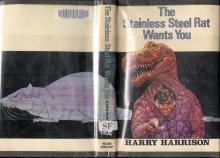 The Stainless Steel Rat Wants You ssr-4
The Stainless Steel Rat Wants You ssr-4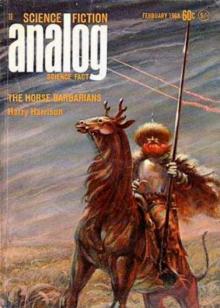 The Horse Barbarians tds-3
The Horse Barbarians tds-3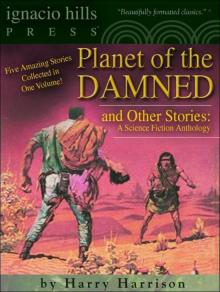 Planet of the Damned and Other Stories: A Science Fiction Anthology (Five Books in One Volume!)
Planet of the Damned and Other Stories: A Science Fiction Anthology (Five Books in One Volume!)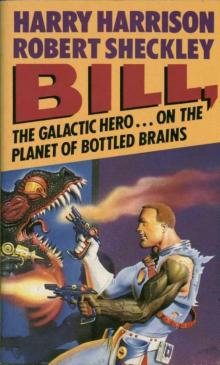 On the Planet of Bottled Brains
On the Planet of Bottled Brains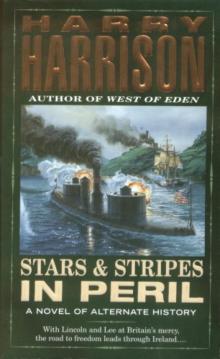 Stars And Stripes In Peril
Stars And Stripes In Peril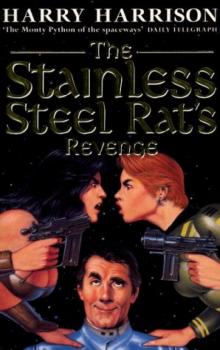 The Stainless Steel Rat's Revenge
The Stainless Steel Rat's Revenge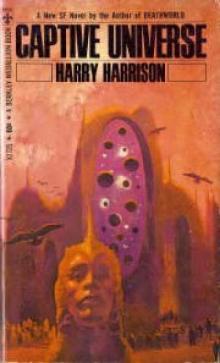 Captive Universe
Captive Universe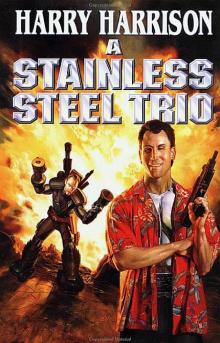 The Stainless Steell Rat Sings the Blues ssr-8
The Stainless Steell Rat Sings the Blues ssr-8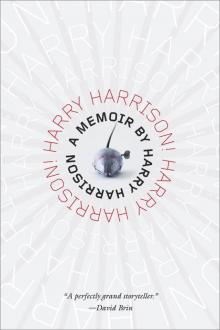 Harry Harrison! Harry Harrison!
Harry Harrison! Harry Harrison!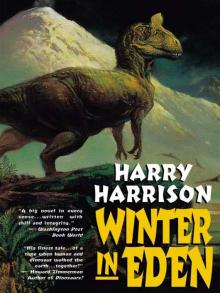 Winter in Eden
Winter in Eden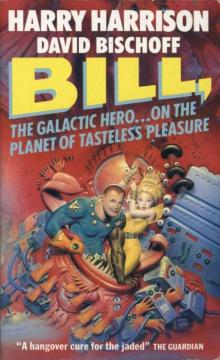 On the Planet of Tasteless Pleasures
On the Planet of Tasteless Pleasures